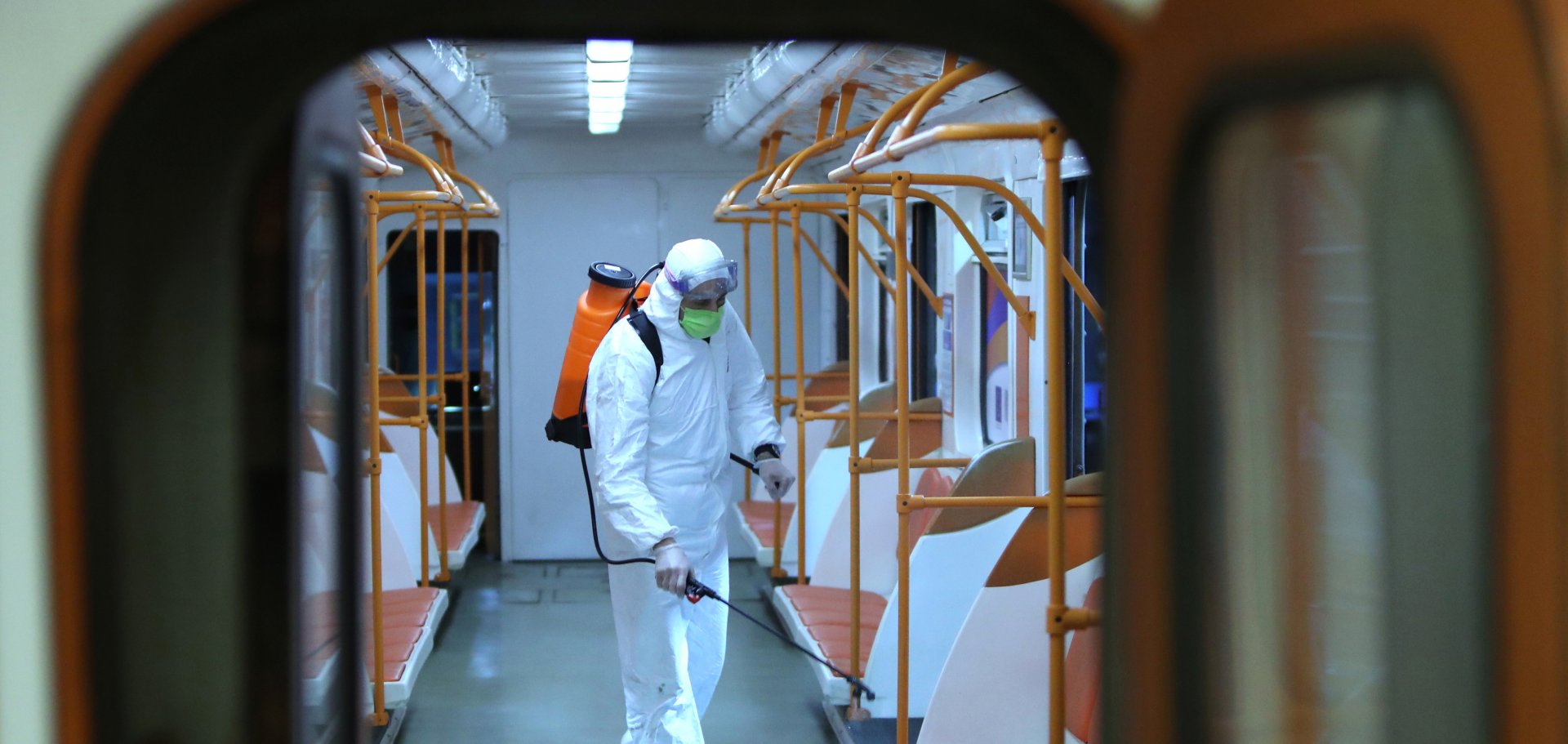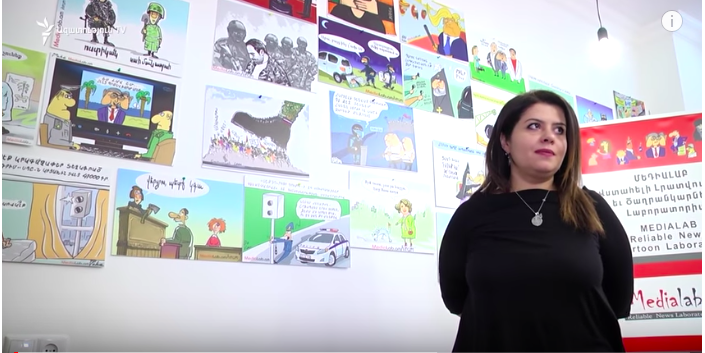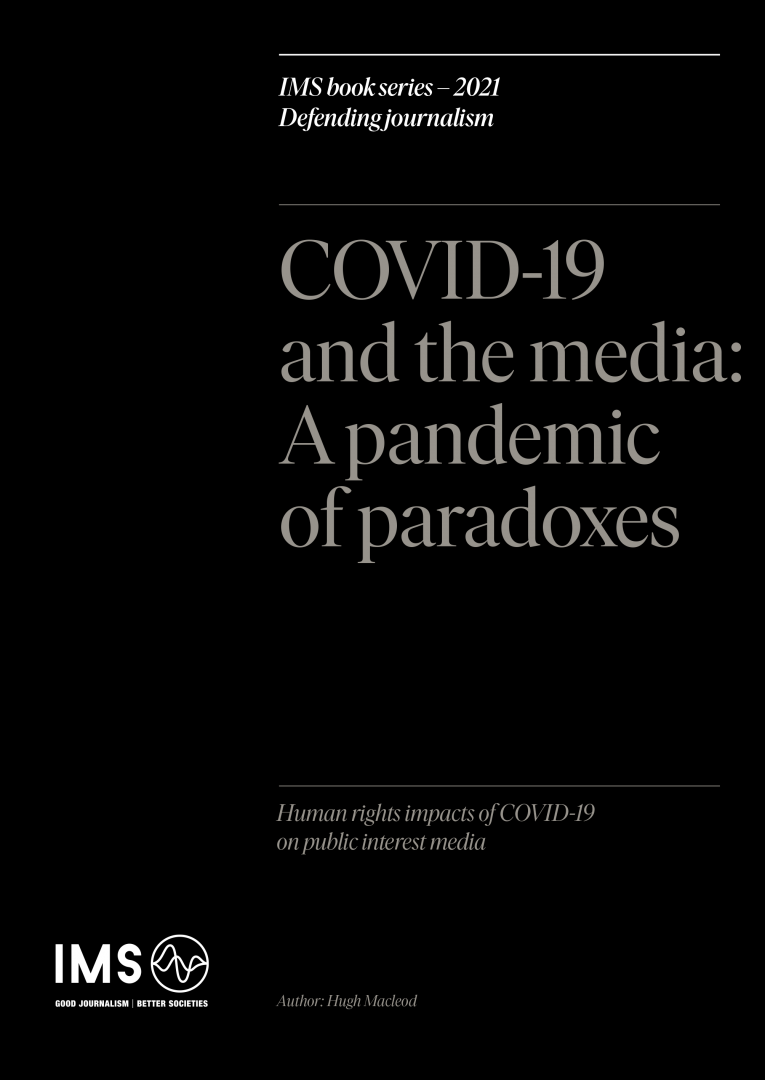YEREVAN, ARMENIA - APRIL 2: Police controls vehicles at the entrance to Yerevan due to coronavirus (COVID-19) pandemic concerns in Yerevan, Armenia on April 2, 2020. (Photo by Vahram Baghdasaryan/Anadolu Agency via Getty Images)
Armenia: Weaponising Coronavirus
In Armenia, a swift reopening of the country and a viral disinformation campaign has put the country’s weak healthcare system on the verge of collapse. An Armenian media outlet is using satire to challenge fake news and conspiracy theories.
Swift reopening results in looming health crisis
In Armenia, a country of approximately three million people, the first case of Covid-19 was detected on 1 March. Until the beginning of April, the situation was evolving slowly in Armenia, and the spread of the virus was under control.
Although the government of Armenia introduced strict quarantine from 16 March to the beginning of May, the number of infected people started growing to 30-40 people per day from early April. Despite the restrictions, society continued to violate regulations and held funerals, engagement parties, Easter celebrations, and other social events, leading to the further deterioration of the situation. After the abandonment of strict confinement rules, the numbers continued to grow, leading to the current levels of 600 new daily cases on average in the middle of June.
The medical system has difficulties and is struggling with the virus due to the insufficient number of ICU beds and underdeveloped medical system. The growing numbers are endangering lives, and further affecting the local political atmosphere. The grievances against the government are being misused by the former government’s satellites.
Since the beginning of the crisis, the government in Armenia has given mixed and often contradicting messages. Often statements from the Prime Minister and from the Minister of Health have been contradicting. Initially, the government refused to accept the seriousness of Covid-19 but in recent months this has changed.
Since mid-March, the government has tried to stop the spread of the virus by informing the population via all acceptable means about the necessary social behavior. Prime Minister Nikol Pashinyan who is a former editor and journalist, and other ministers have used Facebook as their main communication platform during coronavirus educating followers on the proper precautions.

Weaponising coronavirus
On 8 May, a brawl broke out in the Armenian parliament (see video). In a heated discussion concerning rich Armenians who had sought coronavirus bailout money, two opposing politicians; Edmon Marukyan, chairman of the opposition Bright Armenia party, and Sasun Mikaelyan, a member of the ruling My Step Alliance, exchanged blows as Marukyan stepped down from the rostrum.
Since the former Prime Minister, Serzh Sargsyan, resgined from office in 2018 and was followed by current Prime Minister Nikol Pashinyan, Armenians have been faced with a toxic political climate.
As a former journalist and editor, Armenia’s Prime Minister, Nikol Pashinyan, has been communicating tirelessly about the coronavirus on his Facebook page in recent months. Asking citizens to send him examples of careless behaviour, the Prime Minister has been sharing photos and videos of Armenians flocking outside of banks, large groups of old people meeting to play chess in the park and young people partying in big groups.
With more than 600,000 followers, Pashinyan uses his Facebook page to update people on the health crisis in Armenia by live streaming his daily briefings.
In late May when the Prime Minister and several members of his family tested positive for coronavirus, Pashinyan continued educating Armenians on proper coronavirus behaviour from his home shaming those who don’t comply with the official guidelines.
Next to the hectic political climate, the national media landscape is extremely polarised, and the editorial stances of many outlets reflect the interests of their owners.
During the coronavirus crisis, reliable media outlets have put great efforts in raising public awareness and informing the public, but at the same time a large number of smaller media outlets have played an active role in triggering the conflict by sharing rumours and false information.
Through private TV channels and social media platforms, conspiracy theories are spreading, reaching large parts of the Armenian people. The main message of most of these theories is that the virus doesn’t exists.
Some of the conspiracy theories come from national news outlets, while others are created by political groups – often on the far-right wing.
A conspiracy theory widely shared on social media claims that Bill Gates is using the coronavirus to implant microchips in people across the world.
“I don’t think anyone believes that the virus exists”
As Armenia is facing a national health disaster, the virus seems to be dividing the population, provoking many different attitudes.
In the streets of Armenia’s capital Yerevan, we talked to four Armenians about life in times of coronavirus.
MediaLab is using satire to challenge false stories
Since the start of the pandemic, MediaLab.am has been using satire and humor to try and affect public behaviour and make people understand the extent of the crisis in Armenia.
Next to the more in-depth journalistic work of MediaLab, their moving cartoons have been incredibly popular on social media where they have been shared widely by Armenians advising others to change their behaviour:
“With our moving cartoons we are trying to give people a shock. For example, one of our most popular cartoons show a group of people sitting closely together. Coronavirus is dancing on the table, and doctors are carrying out coronavirus patients. This was shared by so many people.”

Many people in Armenia believe in false stories about coronavirus; for instance that Bill Gates wants to implant trackable microchips inside people. This is a widely spread story in Armenia.
Marianna Grigoryan – EDITOR-IN-CHIEF MEDIALAB.AM

Covid-19
A TURNING POINT FOR INDEPENDENT MEDIA?
Around the world, Covid-19 is re-awakening people to the vital role that independent media plays in their societies.
From Afghanistan to Zimbabwe, many independent media outlets are seeing their audiences grow as people realise they need quality information to navigate the crisis.

